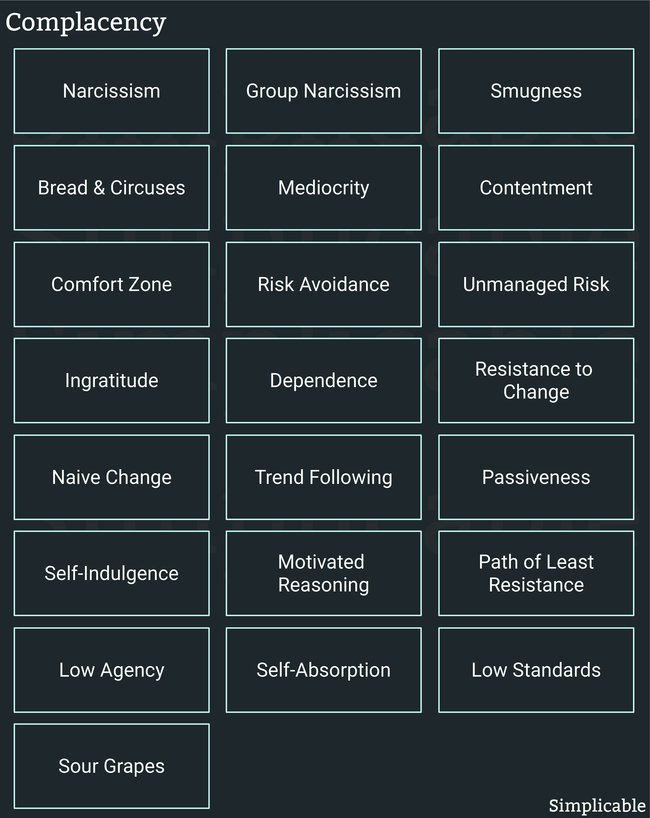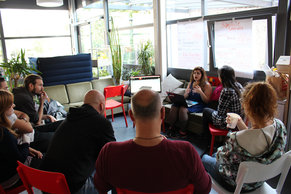

Narcissism
The feeling that you are better than others despite evidence to the contrary. This is essentially contentment based on denial of reality.Group Narcissism
It is possible for a society, culture or organization to suffer from collective narcissism. For example, a company that has excessive pride about its past such that it isn't facing its current state of decline.Smugness
Excessive pride often brings complacency as you overrate yourself compared to the competition and therefore underestimate the effort required to continue to be successful. For example, a musician who goes on a massive ego trip after one hit such that they fail to focus enough to recapture their creative process.Bread & Circuses
The theory that the masses don't care what happens as long as they are provided with basic material needs and entertainment.Mediocrity
Mediocrity is a pathetic state whereby an individual seeks the safety, comfort and security of a group while minimizing their contributions to that group.Contentment
The theory that you should simply be happy whatever is going on in your life could be accused of encouraging complacency. It is possible to simply decide to be happy in any situation. This is fine as long as you are also working towards doing something good and productive with your life.Comfort Zone
Avoiding anything that makes you nervous or uncomfortable. For example, a university student who avoids books that include any uncomfortable ideas.Risk Avoidance
Trying so hard to avoid risk that you also avoid opportunity and the chance to fail and build resilience. For example, a parent who prevents their child from enjoying free play.Unmanaged Risk
A failure to manage risk can be viewed as complacency. For example, a parent who takes a vacation without procuring travel medical insurance for their family.Ingratitude
A lack of gratitude whereby you assume you are owed your good fortune. For example, an individual who gets into a top university who fails to see that this is a rare privilege. This may cause the individual to act in ways they may later regret such as failing to take full advantage of the opportunity.Dependence
Becoming overly dependent. For example, if you fail to develop talents and skills you may end up dependent on a single employer such that you find it difficult to leave or recover from being laid off.Resistance to Change
Defending the status quo such that you resist change no matter how beneficial or inevitable. For example, an accounting manager in 1982 who resists the computerization of their department.Naive Change
In some cases, those who embrace aggressive change are also guilty of complacency such as the view that change is always good and automatically produces positive results. For example, a sports league that loses a large number of fans after implementing unpopular new practices, policies or rules.Trend Following
Following trends in a complacent and unthinking way. For example, a CEO who demands that an IT department implement cutting edge technologies without being able to articulate any business benefits.Passiveness
Taking no action when action is clearly beneficial. For example, citizens of a city who watch their air quality decline year after year who take no action to improve their situation.Self-Indulgence
Doing what you feel motivated to do as opposed to what you know you should do.Motivated Reasoning
The process of finding some reason to do what you want to do. For example, an individual on a diet who breaks their diet based on the logic that they feel stressed out so this isn't good timing for a diet.Path of Least Resistance
Always doing things the easiest way. For example, driving to places that you could easily reach by walking or bicycle. Convenience and comfort are the cousins of complacency as an easy life tends to reduce your resilience, motivation and strength.Low Agency
The belief that your fate is out of your hands. For example, the view that you are owed a job as opposed to the view that you earn a job with professionalism, productivity, creativity and reliability.Self-Absorption
Complacency about any problem that doesn't affect you personally.Low Standards
Setting low personal standards. For example, a student who feels a surge of pride after they turn in an essay on time even though the essay was very low quality.Sour Grapes
Viewing anything that you can't easily obtain as being worthless as an excuse not to make any effort. Based on a fable about a fox who sees grapes that are too high to reach so she decides they must be sour.| Overview: Complacency | ||
Type | ||
Definition (1) | A state of easy contentment. | |
Definition | A lack of concern or awareness of change, competition, risks, resilience and problems. | |
Related Concepts | ||






































